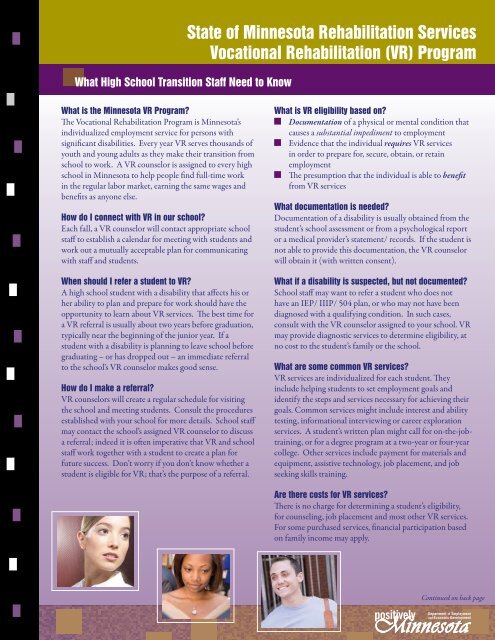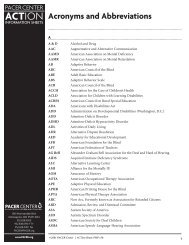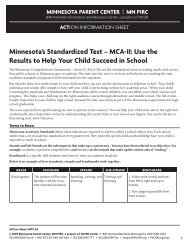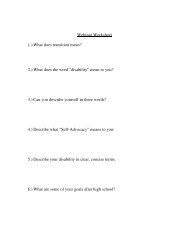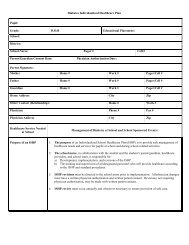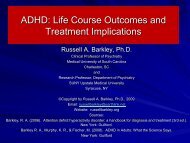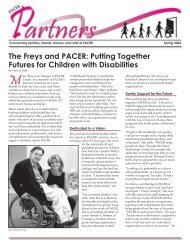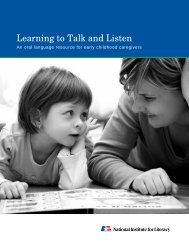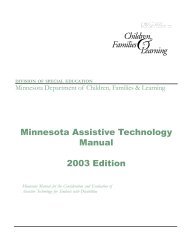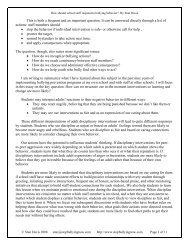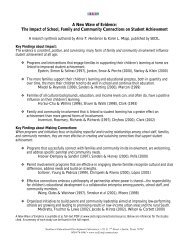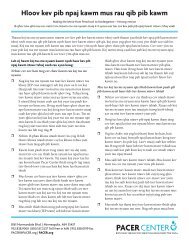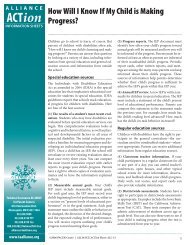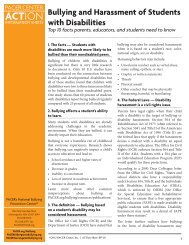State of Minnesota Rehabilitation Services Vocational Rehabilitation ...
State of Minnesota Rehabilitation Services Vocational Rehabilitation ...
State of Minnesota Rehabilitation Services Vocational Rehabilitation ...
- No tags were found...
You also want an ePaper? Increase the reach of your titles
YUMPU automatically turns print PDFs into web optimized ePapers that Google loves.
What High School Transition Staff Need to Know<strong>State</strong> <strong>of</strong> <strong>Minnesota</strong> <strong>Rehabilitation</strong> <strong>Services</strong><strong>Vocational</strong> <strong>Rehabilitation</strong> (VR) ProgramWhat is the <strong>Minnesota</strong> VR Program?The <strong>Vocational</strong> <strong>Rehabilitation</strong> Program is <strong>Minnesota</strong>’sindividualized employment service for persons withsignificant disabilities. Every year VR serves thousands <strong>of</strong>youth and young adults as they make their transition fromschool to work. A VR counselor is assigned to every highschool in <strong>Minnesota</strong> to help people find full-time workin the regular labor market, earning the same wages andbenefits as anyone else.How do I connect with VR in our school?Each fall, a VR counselor will contact appropriate schoolstaff to establish a calendar for meeting with students andwork out a mutually acceptable plan for communicatingwith staff and students.When should I refer a student to VR?A high school student with a disability that affects his orher ability to plan and prepare for work should have theopportunity to learn about VR services. The best time fora VR referral is usually about two years before graduation,typically near the beginning <strong>of</strong> the junior year. If astudent with a disability is planning to leave school beforegraduating – or has dropped out – an immediate referralto the school’s VR counselor makes good sense.How do I make a referral?VR counselors will create a regular schedule for visitingthe school and meeting students. Consult the proceduresestablished with your school for more details. School staffmay contact the school’s assigned VR counselor to discussa referral; indeed it is <strong>of</strong>ten imperative that VR and schoolstaff work together with a student to create a plan forfuture success. Don’t worry if you don’t know whether astudent is eligible for VR; that’s the purpose <strong>of</strong> a referral.What is VR eligibility based on?Documentation <strong>of</strong> a physical or mental condition thatcauses a substantial impediment to employmentEvidence that the individual requires VR servicesin order to prepare for, secure, obtain, or retainemploymentThe presumption that the individual is able to benefitfrom VR servicesWhat documentation is needed?Documentation <strong>of</strong> a disability is usually obtained from thestudent’s school assessment or from a psychological reportor a medical provider’s statement/ records. If the student isnot able to provide this documentation, the VR counselorwill obtain it (with written consent).What if a disability is suspected, but not documented?School staff may want to refer a student who does nothave an IEP/ IIIP/ 504 plan, or who may not have beendiagnosed with a qualifying condition. In such cases,consult with the VR counselor assigned to your school. VRmay provide diagnostic services to determine eligibility, atno cost to the student’s family or the school.What are some common VR services?VR services are individualized for each student. Theyinclude helping students to set employment goals andidentify the steps and services necessary for achieving theirgoals. Common services might include interest and abilitytesting, informational interviewing or career explorationservices. A student’s written plan might call for on-the-jobtraining,or for a degree program at a two-year or four-yearcollege. Other services include payment for materials andequipment, assistive technology, job placement, and jobseeking skills training.Are there costs for VR services?There is no charge for determining a student’s eligibility,for counseling, job placement and most other VR services.For some purchased services, financial participation basedon family income may apply.Continued on back page
Can VR pay for transition services while a student is stillin high school?The student’s needs and the terms <strong>of</strong> the IEP/ IIIP/ 504 planand VR employment plan should drive service decisions.<strong>Minnesota</strong>’s secondary schools are required to provide astudent’s transition services while the student remains inschool. Therefore, VR does not typically fund servicesuntil the student graduates. However, in some cases it maybe appropriate to provide a VR service before graduation.Sharing <strong>of</strong> such costs can be discussed.What can I do to collaborate effectively with VR?Because ongoing communication between school staff andVR is important for student success, VR should be invitedto all IEP and IIIP meetings <strong>of</strong> their eligible students. Theearlier VR is notified <strong>of</strong> a meeting, the greater the likelihoodthey will be able to attend.Do students have choices?VR staff work with each student and their IEP team to createan individualized employment plan that helps students makeinformed choices about their job goals and to identify whichservices are needed and who will provide them. Studentsmay decide to develop plans on their own or with the help<strong>of</strong> someone <strong>of</strong> their choosing. But it is important to knowthat VR must approve these plans prior to VR purchasingservices.What is VR’s data practices policy in thehigh schools?VR can receive names <strong>of</strong> students that a school would liketo refer for a VR orientation as well as perform orientationsessions with students without written consent. (Anorientation is when VR staff meets with students toprovide basic information about VR services.)However…VR must have a copy <strong>of</strong> written consent from astudent (and parent/ guardian where appropriate)in order to speak with school staff about a student’spersonal information (this includes getting/releasinginformation in an IEP meeting).VR must have a signed Tennessen Notice from astudent (and parent/ guardian where appropriate) toobtain personal information from them.How do I find out more?You can always learn the name and telephonenumber <strong>of</strong> the VR counselor assigned to a schoolby calling 1.800.328.9095, or 651.296.5616,TTY 1.800.657.3973, or TTY 651.296.3900, orby logging on to www.deed.state.mn.us/rehab/transition.DEED-70613-018-07-6,000


